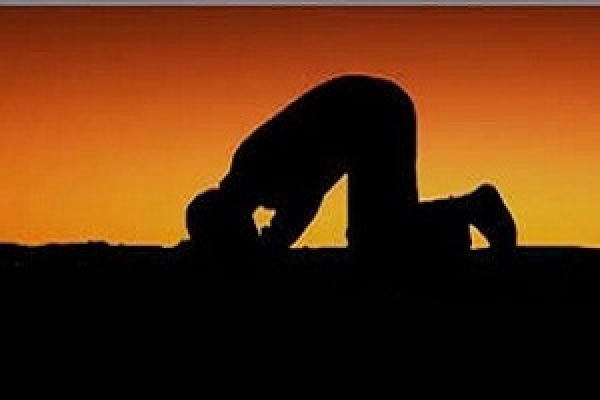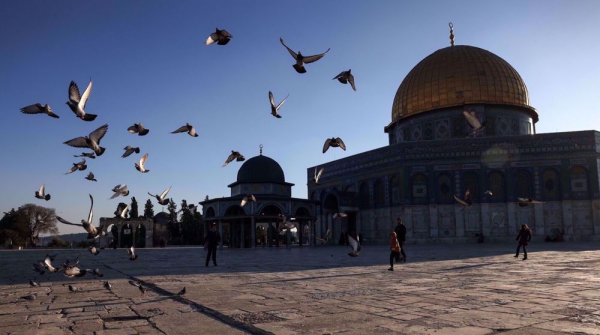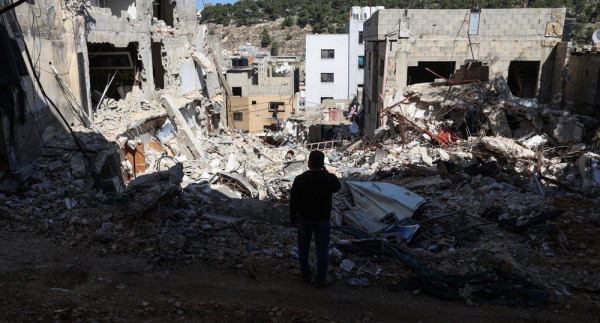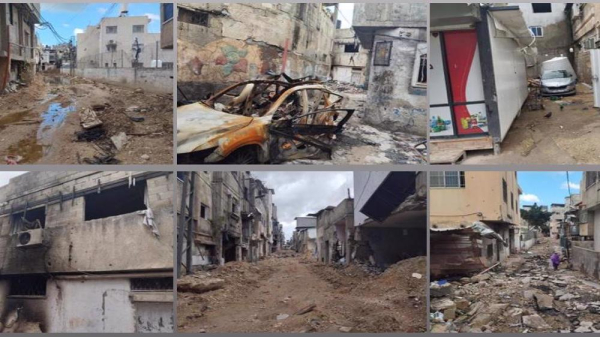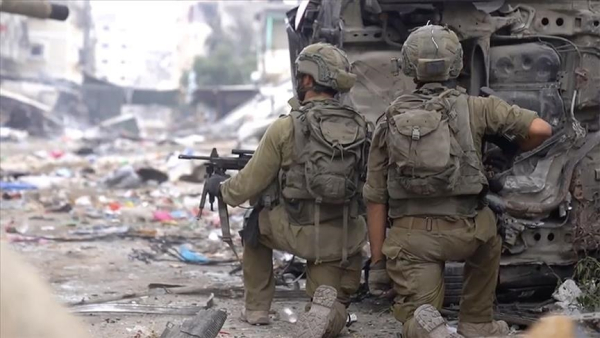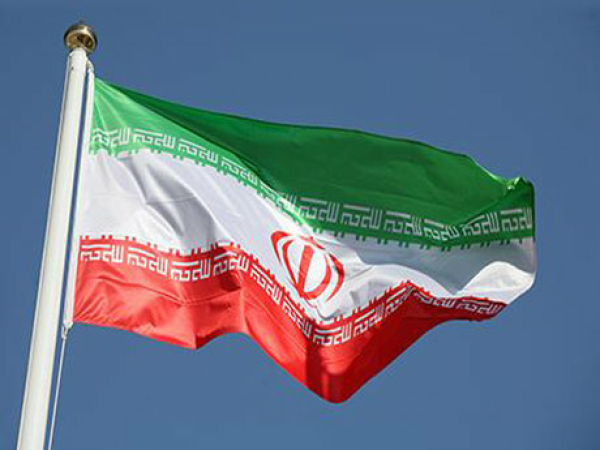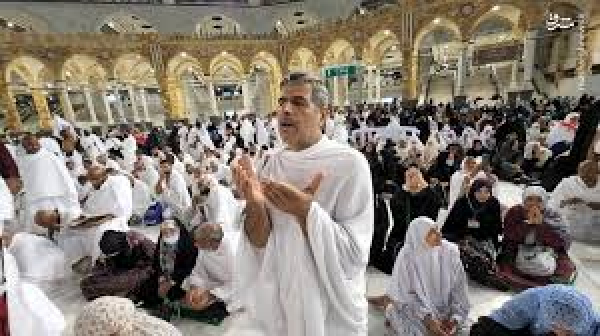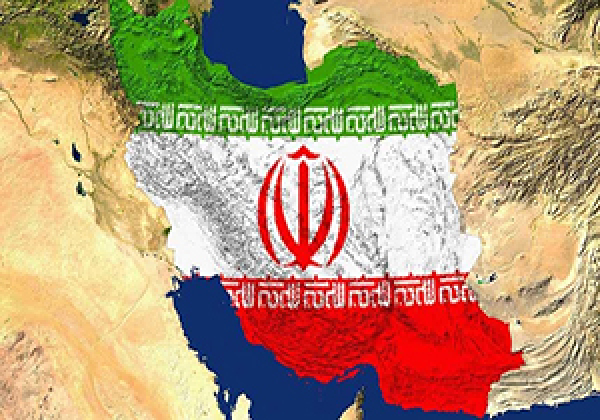zarezadeh
Does praying affect the body?
Yes
Praying and its scientific effects on pain reduction have been proven.
Stress reduction: By creating mental peace, prayer can reduce stress and mental tension that lead to pain.
Physical movements: Prayer movements such as bowing and prostration help improve blood circulation and reduce muscle and joint pain.
Increased endorphins: Spiritual practices such as prayer may increase levels of endorphins, the body's natural painkillers.
Source: The Book of Modern Sciences in Islam
Israeli restrictions on al-Aqsa Mosque during Ramadan
In a statement published on the Palestinian resistance group's Telegram channel on Saturday, senior Hamas member Abdul Rahman Shadid issued a call to action, urging Palestinians to converge on the courtyard of the sacred site throughout the Muslim fasting month.
He emphasized that Palestinians “must not surrender to the restrictions of the occupiers. We must confront them with all our strength and adhere to our historical and religious right to the blessed mosque.”
Shadid called for “roaring crowds” to protect the al-Aqsa Mosque compound all through Ramadan.
Earlier, Hamas condemned in the strongest terms the Israeli police’s measures to “restrict worshippers’ access to al-Aqsa Mosque during Ramadan, allowing only 10,000 worshippers to attend Friday prayers.”
The Gaza-based movement described these steps as “a new escalation against the Palestinian people and their holy sites, a dangerous precedent that undermines freedom of worship at al-Aqsa Mosque, a blatant violation of all conventions and religious laws, and a direct provocation to Muslim sentiments.”
The movement also considered it “a desperate attempt to impose alleged control over the mosque.”
Hamas affirmed that “the Zionist entity’s crimes and aggressive plans against al-Aqsa Mosque – Islam’s third holiest site and a symbol of Palestinian identity – will not succeed in erasing its identity or altering its history.”
The movement stressed that “Al-Aqsa will remain an exclusive Islamic endowment, with no place for the occupation. Our people and our nation will defend it with their lives until it is fully liberated from occupation.”
Hamas warned the occupying Israeli regime against “proceeding with such measures,” holding it fully responsible for any escalation that may happen.
The movement called on the Organization of Islamic Cooperation (OIC) and the international community to “take serious action to stop the crimes and violations of the occupation against al-Aqsa Mosque and to ensure that the Palestinian people can freely practice their religious rituals there.”
Hamas finally urged Palestinians across the West Bank, al-Quds and elsewhere in the occupied territories to “intensify their presence at al-Aqsa Mosque, engage in worship and seclusion there during Ramadan, and confront all attempts by the occupation and extremists to desecrate or impose control over the mosque.”
Press TV’s website
Israeli bulldozers demolish homes in West Bank; Hamas urges UN to stop 'war crimes'
Israeli bulldozers demolish homes in West Bank; Hamas urges UN to stop 'war crimes'
A man looks at destroyed buildings at the Nur Shams camp for Palestinian refugees near Tulkarem, in the occupied West Bank on February 26, 2025. (AFP)
Hamas says Israel has once again committed war crimes by the demolition of homes of Palestinians on the first day of the holy month of Ramadan in the occupied West Bank's Nur Shams refugee camp.
Israel’s large-scale onslaught on Tulkarm, its refugee camps rages as more Palestinians uprooted in West Bank
he Israeli military is pressing ahead with its intensified acts of aggression and destruction across the occupied West Bank, causing several injuries and forcing numerous Palestinians out of their homes.
Reports coming out of the occupied Palestinian territory pointed to continuation of the indiscriminate assaults across many cities and towns, including the northern cities of Jenin and Tulkarm, and the central city of Salfit’s vicinity.
The reports came amid warnings by various Palestinian and international groups and personalities about the regime’s intentions to annex the territory and turn it into another Gaza Strip, where more than 15 months of a genocidal Israeli war claimed the lives of over 48,300 Palestinians, mostly women and children.
Reports said Israeli occupation troopers deployed after midnight additional military reinforcements to Tulkarm and Nur Shams camps. Troops fired live ammunition intensively, while explosions were heard in the Jabal al-Nasr area of Nur Shams camp.
According to the official Palestinian Wafa news agency, the regime forces seized residential buildings, particularly those facing Tulkarm camp, converting them into military outposts while deploying military vehicles and bulldozers in the area.
The Israeli siege on Tulkarm and Nur Shams refugee camps remains in place, with Israeli forces enforcing a complete lockdown.
The most recent bouts of Israeli aggression saw a three-month-old infant suffocate from tear gas fired by Israeli forces at the entrance of the Jenin refugee camp in the city of Jenin in the northern West Bank.
The Palestine Red Crescent Society reported that its medical teams had transported the victim to the hospital after she was exposed to the toxic materials.
The Israeli regime has continued its military onslaught on Jenin and its refugee camp for the 41st consecutive day, resulting in the killing of 27 Palestinians, along with dozens of injuries and detentions.
The ongoing aggression has also led to the forced displacement of residents and widespread destruction of infrastructure and homes, with around 120 houses completely destroyed and dozens more partially damaged.
Earlier this week, the Gaza Strip-based resistance movement Hamas said the regime had once again committed war crimes with its demolition of homes of Palestinians on the first day of the holy month of Ramadan at the Nur Shams camp.
Press TV’s website
Israeli forces kill Palestinian during Jenin raid as UN ‘alarmed’ by West Bank onslaught
Israeli forces kill a Palestinian in their raid on Jenin as the Tel Aviv regime presses ahead with a large-scale onslaught against the occupied West Bank.
Israeli forces on Tuesday handed the body of a Palestinian they had shot dead in the eastern neighborhood of Jenin to the Palestine Red Crescent Society, Al Jazeera said in a report, without giving further details.
Earlier, armored Israeli military vehicles stormed Jenin as part of the current massive raid on the city.
The Jenin refugee camp in the northern West Bank is bearing the heavy brunt of the occupying entity’s ongoing aggression.
Separately, Israeli forces also shot and wounded at least four other Palestinians near Nablus, including a 13-year-old who was hit in the chest by live fire.
Now in its 43rd day, the large-scale onslaught by the occupying regime's forces has claimed the lives of at least 27 Palestinians in Jenin and its refugee camp.
The ongoing aggression has also led to the forced displacement of residents and widespread destruction of infrastructure and homes, with around 120 houses completely destroyed and dozens more partially damaged.
On Monday, The United Nations High Commissioner for Human Rights Volker Türk sounded the alarm over Tel Aviv’s military aggression in the occupied West Bank.
“In the West Bank, I am alarmed by the use of military weapons and tactics, including tanks and airstrikes, against Palestinians; the destruction and emptying of refugee camps; the expansion of illegal settlements; the severe restrictions on movement; and the displacement of tens of thousands of people,” he said before the 58th session of the Human Rights Council in Geneva, Switzerland.
Türk also stressed that “Israel’s unilateral actions and threats of annexation in the West Bank, in violation of international law, must stop.”
Meanwhile the Settlement Resistance Commission, a Palestinian governmental body dedicated to opposing Israeli settlement expansion and the construction of the so-called separation wall in the occupied Palestinian territories, said in a new report that Israeli forces and settlers carried out 1,705 attacks in February.
Muayyed Shaaban, head of the commission, said that Israeli forces conducted 1,475 of these attacks, while settlers carried out 230, the official Palestinian Wafa news agency reported.
He added that the majority of these attacks were concentrated in Nablus, which saw 300 attacks, followed by al-Khalil with 267 and Ramallah with 263.
According to the report, Israeli forces also carried out 79 demolition operations against Palestinians in February, affecting 156 structures, including 109 inhabited homes.
Press TV’s website
Why is Iran fighting Israel and its allies and not compromising?
Iran does not intend to incite a fire in our region; but the important and fundamental point that must be taken into account is that if any action is to be taken against the positions, interests, soil and people of Iran, the Islamic Republic will undoubtedly respond without any indulgence or appeasement and take its revenge. In addition, it is worth mentioning that the Islamic Republic has announced its support for the axis of resistance from the beginning without any hesitation and without any shortcomings and shortcomings and is pursuing this issue. Basically, it must be considered that the Islamic Republic has supported the axis of resistance in other ways without directly entering the recent war and has engaged in confrontation with the Zionist regime. However, it is the Zionist regime that has committed aggression without adhering to red lines and international rules and forced the Islamic Republic of Iran to directly enter the field to contain it.
If international bodies such as the United Nations and the Hague Tribunal were to make a decision against Israel, they would be virtually invalid and we would find that they would not be very strict against it. Now, the fundamental issue is that in such circumstances, where no one is stopping Israel and its numerous crimes, we must stand up to it and take action.
Why do Muslims accept the miracle of the birth of Christ, but do not consider him the Son of God?
First, if the meaning of being the Son of God is a true meaning, in accordance with the Muslim belief in God, who is inconceivable in terms of any defects, flaws, combinations, needs, limitations, and issues of this kind, it cannot be plural.
Second, if we consider this term metaphorically - such as becoming divine and purifying the soul - then it will not be specific to Prophet Jesus (peace be upon him) and will include many believers.
Third, if the description of Prophet Jesus (peace be upon him) with this title is due to the special creation of Prophet Jesus (peace be upon him), this title is much more suitable for Prophet Adam (peace be upon him).
Are there different types of charity?
The Prophet Muhammad (peace and blessings of Allah be upon him) said in a hadith: “Charity is of five kinds.” These five kinds include the following:
1. Charity that is rewarded tenfold: This charity is the money that we set aside as charity in the early morning, without knowing who it will reach.
2. Charity that is multiplied seventyfold: This charity is given to those who are helpless and disabled and cannot earn an income.
3. Charity that is multiplied seven hundredfold: This charity is given to respectable and needy relatives and neighbors, and should also be given as a gift to maintain one’s honor.
4. Charity that is multiplied seven millionfold: This type of charity is for spreading the teachings of God’s religion and building schools, hospitals, and mosques, which has greater social benefits.
5. The charity that has the greatest reward: This charity is given to deceased parents and those with rights.
Hajj; A Journey to the Heart of Resurrection and a Return to the Pure Truth of Humanity
Hajj is not only a religious duty, but also a spiritual experience in which the Resurrection is clearly and fully demonstrated. This spiritual journey not only brings everyone together in one physical place, but also creates a deep inner alignment among humans. Here, racial, linguistic, and social differences fade away and everyone comes together in front of the one truth that is God. Hajj is the Resurrection embodied; an experience in which a person realizes the return to his origin and truth and goes to the heart of the earth to meet the Resurrection.
Hajj is the Resurrection embodied, not only in the sense that the individual sees his body at that moment alongside other humans in a holy land, but also because the Hajj has the depth and meaning of the Resurrection in its heart. Amidst the endless whirlwind of people heading towards the House of God, what attracts the eye most is the presence of a truth. A truth that is evident in every moment of this worship; people, with all their apparent differences, respond to a sacred purpose.
This scene is as if it were an objective experience of the Day of Judgment. In the Hajj, just as on the Day of Resurrection, all people gather in a single line to answer the call of God, in this land too, everyone finds themselves on a single path and a single will with one intention and in response to the divine call. At that moment when hearts are connected to one point, all worldly attachments collapse and what remains is only the truth of humanity and connection with God.
In the Hajj, a person is not only physically placed alongside others, but also spiritually placed in a deep alignment with others. This is one of the most beautiful and delightful aspects of Hajj; everyone is immersed in a spiritual flow, without asking each other questions about identity, race, color or social status. There is only one truth here, and that is the truth of servitude. The truth that says that no human being will be anything but servitude and submission to God.
Hajj is, in fact, an experience that reminds man that life is nothing but a journey towards truth. On this journey, humans, unaware of all worldly divisions and labels, search for that pure truth in the heart of the earth. At this moment, it is as if all humanity unites at one point and bows down before God.
This deep and experiential spirituality in Hajj is actually more than a religious duty. It is a return to the origin, a return to the truth that lies within every human being. In this journey, a person reaches a point where nothing has any real meaning in the face of divine love and a truth greater than their own. What happens in the Hajj is a person’s realization of oneness and connection to all of existence.
And perhaps one of the greatest messages of the Hajj for humans is this: that ultimately, in the sight of God, there is no difference. In the sight of Him, all humans are one truth, without any boundaries or distances. Everyone will return to Him, regardless of their background or what they have had in this world. What remains is the only truth that flows in the hearts of humans, and on that great day, before God, all humans will march in a line, hand in hand, toward the truth.
The Hajj, this embodied resurrection, shows us that life is full of different tests and experiences, but in the end, everything will come to one point. At that moment, only the truth will remain, and we will know that this truth, just as it will be on the Day of Judgment, is present in every soul, in every moment of life, and in every experience that a person has on the path of God. This is the "return to God" that the Hajj takes us to; a journey that begins in the heart of the earth and reaches the infinite truth in the heavens.
Iran's indispensable role in combating global terrorism and promoting peace
By Seyed Pezhman Madani
Iran’s pivotal role in the fight against global terrorism and its broader contributions to global stability are often misunderstood and even manipulated in international discourse, particularly in Western media.
While the Islamic Republic of Iran is frequently portrayed in a negative light, its efforts to combat terrorism, support regional stability, and contribute to global peace have been significant.
Iran’s role in curbing the spread of violent extremism, stabilizing volatile regions, and fostering diplomacy offers valuable resources for global counterterrorism efforts, providing notable benefits to the region and the world at large.
One of the most significant aspects of Iran’s contributions to global security is its consistent and active role in combating terrorism, particularly concerning groups like Daesh, al-Qaeda, and other extremist terrorist organizations.
These groups do not only pose a threat to West Asia but also have global ramifications, affecting countries in Europe, North America, and beyond. Iran's strategic actions in Iraq, Syria, and Lebanon have been crucial in preventing the expansion of transnational terrorist networks.
In Iraq and Syria, where Daesh Takfiri terrorists once posed a major threat, Iran’s military and intelligence presence was essential in dismantling the group. Cooperation between the Popular Mobilization Forces (PMF) and the Iraqi government played a key role in eradicating the terrorist organization and preventing its further expansion into Europe and the US
Iran’s direct military intervention in the fight against Daesh significantly reduced the group's ability to launch large-scale attacks in other parts of the world, thereby enhancing global security.
The potential resurgence of such terrorist organizations poses an ongoing threat not only to West Asia but to global peace, making Iran’s involvement a crucial factor in countering their reach.
The European Union and the United States have also faced blowback from terrorist organizations that were initially created or supported by Western powers in West Asia, as former U.S. President Donald Trump previously admitted. These attacks underscore the dangers posed by radicalized elements.
Iran's strategic role in preventing the spread of terrorism cannot be overstated. By actively countering terrorist organizations within the West Asia region, Iran has helped stem the flow of foreign mercenary fighters and limit the operational capabilities of groups that might target Europe or North America.
By supporting local governments and resistance groups, Iran has also prevented these terrorist organizations from establishing strongholds where they could train and launch attacks against nations worldwide.
Furthermore, Iran’s extensive intelligence network, deeply embedded in the region, has provided valuable insights into terrorist movements and operations.
This intelligence has been shared with international actors, including Europe, China, Russia, and others, further demonstrating Iran’s crucial role in counterterrorism efforts. Despite strained diplomatic relations between the US and Iran, intelligence cooperation has undeniably contributed to greater global security, particularly in Europe, where the risk of terrorism remains high.
Iran’s approach to combating terrorism and promoting stability stands in stark contrast to the policies of some Western nations. The US and European powers have frequently relied on military interventions to address terrorism and regional instability, often resulting in prolonged conflicts and unintended consequences. The imposed wars on Iraq and Afghanistan, for example, led to significant loss of life, displacement, and regional instability, with effects that extended far beyond West Asia.
In contrast, while Iran’s approach is not without complexities, it has often focused on supporting local actors, providing intelligence, and engaging in diplomatic efforts.
By avoiding direct military intervention in many cases and instead offering strategic support to regional governments, Iran has contributed to a more sustainable approach to addressing terrorism and regional instability.
Iran’s contributions to global security extend beyond counterterrorism to include the fight against drug trafficking, a global threat with devastating consequences. According to the United Nations Office on Drugs and Crime (UNODC), approximately 271 million people worldwide used drugs in 2020, with opioids being the most harmful category.
Afghanistan, which produces around 85 percent of the world's opium, serves as the epicenter of this crisis. From there, narcotics are smuggled through various routes, including the Balkan Route and the Southern Route, into Europe, Africa, and other parts of the world.
Iran, sharing a long and porous border with Afghanistan and Pakistan, serves as a critical frontline defender in the global war on drug trafficking. Its strategic location makes it both a victim of the crisis and a key player in preventing the spread of narcotics.
The impact of the illicit drug trade extends beyond Iran’s borders, affecting global economies, destabilizing societies, and undermining development efforts. Iran’s anti-drug efforts contribute significantly to international stability and security.
These measures have proven effective in disrupting drug supply chains. For instance, Iranian authorities seize thousands of tons of narcotics annually, preventing them from reaching European and other international markets. In 2022 alone, Iran confiscated over 1.4 million kilograms of opiates and synthetic drugs, underscoring its pivotal role in global drug control efforts.
The fight against drug trafficking has come at a tremendous human cost for Iran. Since the early 1980s, more than 4,000 Iranian law enforcement officers and military personnel have lost their lives while confronting armed drug traffickers. Thousands more have been injured in violent clashes with heavily armed smugglers determined to protect their illicit trade.
These sacrifices highlight Iran's dedication to safeguarding not only its own citizens but also the global community from the scourge of drug addiction.
The financial burden of combating drug trafficking is equally staggering. Iran allocates substantial funds annually to securing its borders, training personnel, and acquiring the necessary equipment.
Additionally, the indirect costs associated with treating drug addiction and addressing crime-related issues further strain economic resources. Despite these challenges, Iran remains steadfast in its resolve to eliminate drug trafficking from its territory and beyond.
Despite the often-unfair portrayal of Iran in Western media, its role in combating terrorism and promoting global stability should not be underestimated.
Iran’s direct engagement in the fight against groups like Daesh, its commitment to preventing the spread of terrorism to Europe and the US, and its diplomatic efforts to resolve conflicts make it a key player in global security.
While political and ideological differences may persist, acknowledging Iran’s contributions to counterterrorism and regional stability provides valuable insights that could benefit not only Europe and the United States but the entire world.
Seyed Pezhman Madani is a Tehran-based writer and researcher of foreign affairs.
Press TV’s website
